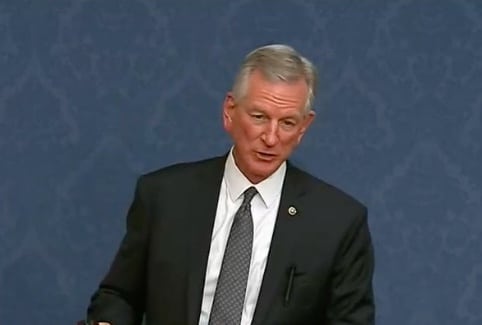Since the Senate returned from August break this week, some Democrats in the chamber have reportedly been speculating ways to get around a block on military promotions by Sen. Tommy Tuberville (R-AL).
Tuberville has been systemically blocking military promotions in protest of the government’s funding to cover travel costs for abortions for service members and their dependents. More than 300 nominations have been held up so far this year, and that number could potentially reach 650 by the end of December.
Because of Tuberville’s blocks, three branches of the military are currently working without a top commander. Defense Secretary Lloyd Austin has called Tuberville’s actions “unprecedented,” “unnecessary” and “unsafe.”
In early August, Austin issued guidance to the military workforce on reshuffling key roles in the wake of Tuberville’s hold. They include assigning certain lower-level officers to lead in an acting capacity.
However, Senate Armed Services Committee Chair Jack Reed (D-RI) said Wednesday in a floor speech, “These positions cannot simply be filled by other officers—they can only be temporarily covered by their vice chiefs, who must also continue to cover their own jobs.”
One Senator on the Senate Armed Services Committee—in this case, Tuberville—is able to hold up potentially countless military promotions through a Senate procedure called “unanimous consent.”
Democratic leadership, including Senate Majority Leader Chuck Schumer (D-NY), remain firmly against holding individual votes on any of the nominees, arguing that doing so would set a dangerous precedent.
“The bottom line is, this is a problem created by Republicans, and it’s up to them to solve it,” Schumer told reporters this week. “We’re not going to shift the burden to Democrats.”
But other Senate Democrats are expressing disagreement with that position. For instance, Sen. Mark Kelly (D-AZ), a Navy veteran on the Armed Service Committee, has signaled he’s open to holding a vote on Biden’s nominee to replace outgoing Chairman of the Joint Chiefs of Staff Gen. Mark Milley: Air Force Chief of Staff Gen. C.Q. Brown.
“I want to do what’s in the best interest of our national security,” Kelly said. Conceding that holding individual votes for the hundreds of blocked nominations is “not practical,” he added, “But for General Brown, you know, it certainly makes sense to get him confirmed.”
Sen. Angus King (I-ME) further suggested that a rule change may be in order.
“The Senate has very broad rules that rest upon assumption of responsibility, restraint and competence. And that’s what’s being breached in this case,” said King, who caucuses with the Democrats.
Tuberville, meanwhile, is holding firm to his stance, insisting, “I’m not holding up appointments…They can bring them up individually quick as they can,” he said. “I’m just holding up 300 at a time.”


